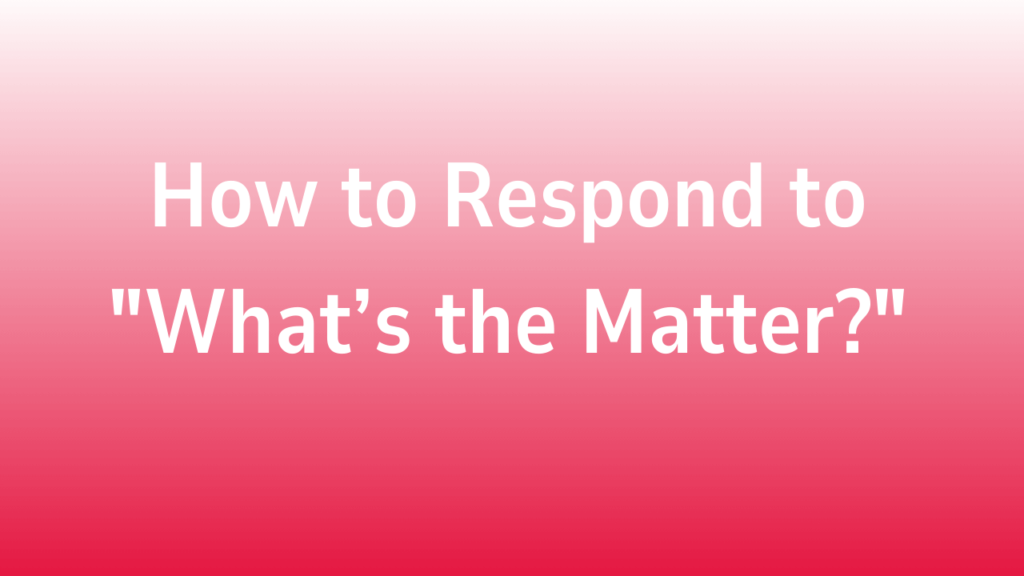We’ve all been in situations where someone asks, “What’s the matter?” It’s a simple question, but the answer can be complex, depending on the circumstances. Whether you’re dealing with a personal problem, feeling down, or just need a little time to process, how you respond to this question can significantly impact the conversation.
In this blog post, we will explore the different ways you can respond to “What’s the matter?” depending on the context. Whether you’re looking for a casual, humorous response or something more serious and thoughtful, we’ve got you covered.
1. Why Do People Ask “What’s the Matter?”
Before diving into how to respond to this question, it’s important to understand why someone might ask it. People typically ask “What’s the matter?” when:
- They Notice Something is Wrong: When someone senses that something is off with you—whether it’s through body language, tone, or behavior—they may ask this question out of concern or curiosity.
- They Want to Offer Support: Sometimes people ask this question because they genuinely want to help and are looking for a way to offer support.
- They’re Checking In: It could be a simple inquiry, especially from a friend or loved one, to see how you’re feeling.
- They’re Trying to Understand: In other cases, this question might come from someone who simply wants to know what’s going on so they can understand the situation better.
Knowing the reason behind the question helps you tailor your response appropriately.
2. How to Respond to “What’s the Matter?”
Your response will depend on the situation you’re in, your relationship with the person asking, and how much you want to share. Below, we’ll break down different scenarios and provide several ways to respond.
2.1 When You’re Feeling Upset or Stressed
If you’re feeling down, anxious, or stressed, it’s important to be honest with yourself and others about what you’re experiencing. Here are some ways to respond when you’re feeling upset:
- “I’ve been feeling a bit overwhelmed lately. I think I just need some time to relax.”
- This response is honest but doesn’t go into too much detail. It communicates that you’re stressed without diving too deeply into the specifics.
- “I’m just going through some stuff right now. Thanks for checking in.”
- This response acknowledges the question while allowing you to keep your personal thoughts to yourself, if you don’t want to elaborate further.
- “I’m a bit down today. Just trying to figure things out.”
- A simple response that shows you’re not in the best mood, but you’re still processing things.
- “Honestly, I’m feeling a bit off. Just trying to make sense of everything.”
- This response gives a little more insight into your feelings without being too specific. It’s honest but not too revealing.
- “I’ve had a lot on my plate today, and it’s starting to catch up with me.”
- If you’re feeling stressed due to work or responsibilities, this response helps explain why you’re not at your best without oversharing.
These responses offer varying degrees of honesty depending on how much you feel like sharing. They acknowledge your emotions while providing space for you to reflect and process.
2.2 When You Want to Keep It Light or Avoid Sharing
Sometimes, you might not want to go into detail or share what’s bothering you. If you prefer to keep the conversation light or avoid talking about the issue, here are some responses you can use:
- “Oh, it’s nothing, just one of those days.”
- This is a casual, dismissive response that tells the other person there’s nothing major going on.
- “Just tired, you know how it is.”
- A simple response that explains your mood without going into any specifics.
- “Nothing really. Just got a lot on my mind.”
- A polite way of acknowledging that something is on your mind, but without elaborating further.
- “I’m fine, just thinking about a few things.”
- This response brushes off the question while hinting that you’re thinking about something, but you’re not ready to share.
- “I’m just being a bit moody today. It’ll pass.”
- A humorous way of downplaying the situation, indicating that you’re aware of your mood but it’s temporary.
These responses allow you to avoid sharing too much while still addressing the question. They are useful when you don’t feel like talking or when you want to keep the conversation casual.
2.3 When You Want to Respond with Humor
Humor can often diffuse tension and make light of an otherwise serious or uncomfortable situation. If you want to respond in a humorous way to lighten the mood, here are some fun responses:
- “I’m just having a love affair with my couch and some snacks right now.”
- A playful response that makes it clear you’re not dealing with anything too serious, just relaxing.
- “The matter? Well, it’s me vs. the laundry pile, and I’m losing.”
- A funny, relatable response that acknowledges your struggle with everyday tasks.
- “I’m just trying to find where I left my motivation.”
- This humorous response can be used when you’re feeling unmotivated or distracted.
- “It’s a long story involving coffee, traffic, and an embarrassing encounter with a pigeon.”
- A quirky, lighthearted way to show that there might not be anything too serious going on, but you’re having a bad day.
- “I’m just trying to get my life together, one meltdown at a time.”
- A humorous response that makes light of the situation without going too deep into your emotions.
These responses use humor to deflect the seriousness of the question and make the conversation more relaxed. They can be especially effective when you don’t want to get into specifics.
2.4 When You Want to Respond with Empathy or Understanding
Sometimes, “What’s the matter?” is a question asked with genuine concern. If you want to acknowledge the person’s empathy and respond thoughtfully, here are some responses that show appreciation and reflect the concern:
- “I really appreciate you asking. It’s just been a tough few days, but I’m managing.”
- This shows that you’re grateful for their concern and gives them an idea of what’s going on without oversharing.
- “It’s been a little stressful, but talking about it helps. Thanks for being here.”
- This response acknowledges that you’re going through something difficult but also appreciates the support.
- “I’ve been struggling with a few things lately, but it’s nice to have someone to talk to.”
- A thoughtful response that thanks the person for checking in while giving a glimpse into your emotional state.
- “It’s a bit overwhelming, but I’m trying to stay positive. Thanks for asking.”
- A response that reflects both the challenge you’re facing and the effort you’re making to stay hopeful.
- “It’s been a bit much recently, but I’m getting through it. I appreciate you checking in.”
- This response combines gratitude with acknowledgment of the tough situation you’re navigating.
These responses are useful when you want to engage with someone empathetically and show that you’re processing your emotions, but you also appreciate their support.
2.5 When You Don’t Want to Answer Directly
There may be times when you simply don’t want to get into the specifics of the situation, whether because it’s personal, sensitive, or just not something you’re ready to discuss. Here are a few ways to dodge the question without coming off as rude:
- “It’s nothing, don’t worry about it.”
- A simple response that indicates you don’t want to talk about it.
- “I’m just not in the mood to talk about it right now.”
- This politely lets the person know that you’re not ready to share details but you appreciate their concern.
- “I’m just dealing with some personal stuff. Let’s talk about something else.”
- This response acknowledges that something is going on, but it sets a boundary by asking to shift the conversation.
- “I’m alright, just processing some things on my own.”
- This lets the other person know that you’re handling it privately and don’t need assistance or a conversation about it.
- “It’s nothing to worry about. Just having one of those days.”
- A casual way to downplay the situation and move on without further details.
These responses provide a way to acknowledge the question without going into specifics. They’re helpful when you want to maintain privacy or avoid discussing personal matters.
3. Table: Different Responses to “What’s the Matter?”
| Context | Response |
|---|---|
| Feeling Upset or Stressed | “I’ve been feeling a bit overwhelmed lately. I think I just need some time to relax.” |
| Wanting to Keep It Light | “Oh, it’s nothing, just one of those days.” |
| Responding with Humor | “I’m just having a love affair with my couch and some snacks right now.” |
| Empathetic Response | “I really appreciate you asking. It’s just been a tough few days, but I’m managing.” |
| Not Wanting to Answer Directly | “It’s nothing to worry about. Just having one of those days.” |
4. Conclusion
The question “What’s the matter?” can be approached in many different ways depending on your mood, the situation, and your relationship with the person asking. Whether you’re feeling stressed and want to be honest, you’re not ready to share and need to deflect, or you just want to lighten the mood with humor, there are numerous ways to respond.
The key is to tailor your response to the situation. Be honest when you can, but also remember that it’s okay to keep things light or private when needed. Ultimately, how you respond to “What’s the matter?” should reflect your comfort level, emotional state, and your relationship with the person asking.



